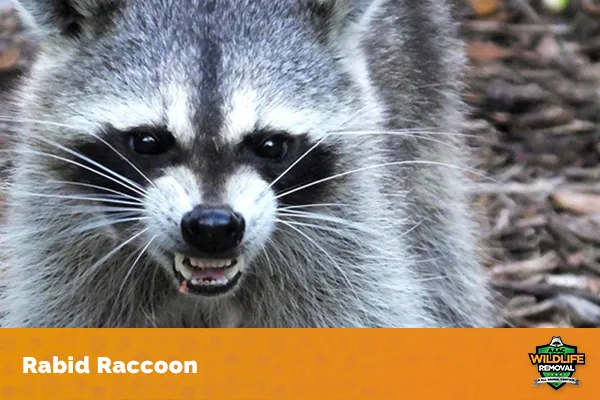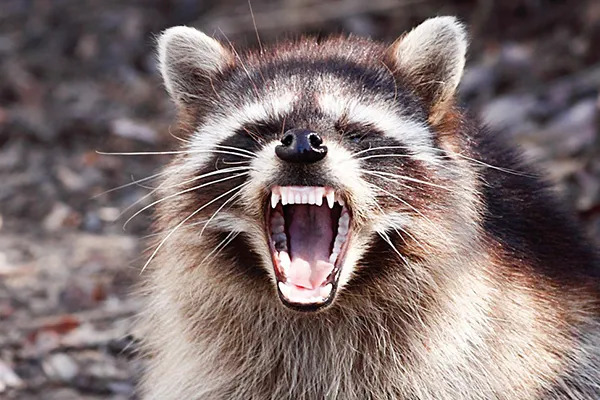Raccoons are known for making lots of noises. If you ever had the experience of having them in your backyard or your house, you know how loud and annoying they can be.
Raccoons are also very vocal animals and they make a variety of sounds and noises. From the pitter-patter of feet to a hissing sound, to growls and barks, raccoons are never silent.
Although they mostly make noises at night when they look for food and during the mating season, you may still hear them in your neighborhood even if it is daytime. This article will explore the different sounds that raccoons make.

Why Do Raccoons Make Noise?
Raccoons create different types of sounds for many reasons. We can break them down into several categories: territorial, mating, parenting, and communication between individuals within their group or pack.
Raccoons can interact with their kind with more than 200 different sounds. They are quite vocal creatures and they use different types of squeaks, whines, purrs, growls, snarls, hisses, and screams as they try to warn, attract, intimidate, and socialize.
What Do Raccoons Sound Like? – Sounds Raccoons Make
- Chittering
- Growl and Bark
- Purring
- Growl
- Bark
- Screech
- Hiss
Raccoons usually use these sounds in combination with each other. They use facial and physical cues to express how they feel and it is important to be able to understand these gestures.

Chittering
Chittering is the sound that you will hear when a mother raccoon is talking to her baby raccoons. They also do it when they are nervous, scared, or uncomfortable. Chittering is a combination of purring and clicking noises that raccoons make with their throats, teeth, and saliva glands.
Researchers believe that it is a way for mothers to calm their babies down when they are frightened or upset. The babies then respond with a similar sound that tells their mother that they are feeling better.
Female raccoons also do chittering sounds during the mating season to let males know that they are ready to breed. As male raccoons are often by themselves, chittering sounds are the only way for them to find a female so that they can mate.

Growl
Raccoons use a combination of a growl and a bark to communicate with other raccoons or to express excitement, like when they are chowing a big meal or are just generally excited.
They also do it when they feel stressed or threatened. If a raccoon is being cornered or feels as if they are in danger, it will use this type of vocalization to scare the predator away and communicate that it means business.
Mother raccoons also use this vocalization when they’ve lost sight of their babies and are looking for them.
Bark
Raccoons also communicate with a bark that is similar to the sound that dogs make. This vocalization can express either excitement or a way to warn other animals or intruders of their territory.

Purring
It’s a defensive mechanism and a sound of warning that they can be dangerous if provoked. This is usually accompanied by visual cues such as a stiff posture, a baring of the teeth and claws, and raised fur.
Purring is often heard from young raccoons that are still with their mothers. It is a very unique sound and it has been described as the purring of kittens. Kits would usually purr when the mother is licking them and caring for them.
It is also used by adult raccoons to communicate satisfaction and happiness, like when they are eating or in the presence of their young ones.
Screech
The screeching sound is often heard when raccoons are in distress or feeling threatened by something nearby. Raccoons make this sound to convey fear and panic.
They will do it if there is danger nearby or if they feel cornered. The sound can be quite loud and high-pitched, which is why you might hear it outside of your house even with the windows closed.
Hiss
Raccoons also make a hissing noise when they are scared or threatened by something nearby. They do this to scare off other animals like cats, dogs, or humans.
Mother raccoons also do this when a male raccoon is coming dangerously close to their babies. The male raccoon will realize that the mother is serious and back off.
Other Ways of Communicating
Raccoons also communicate or express themselves through their body language. Facial cues can include ears that are forward or back, moving eyelids, raised fur along the tail and shoulders, wrinkled skin around their eyes or muzzle, and raised lips that reveal teeth.
If a raccoon is being cornered or feels as if they are in danger, it will usually lower its head, arch its back, and attempt to look larger than they really are.
Their tail would also puff out to make them look bigger. This is a sign for other raccoons or humans not to mess with them. All these physical cues would typically be accompanied by hissing or growling sounds.

What Kind of Noise Do Raccoons Make at Night?
Aside from their vocalizations, raccoons also make a lot of movement or activity noise during the night. They are nocturnal animals and they will often search for food at this time, which is why you might hear them rustling in your trash cans or rummaging through things like bird feeders.
If there is an open garbage can near one of their nests, they might even climb on top of it to get the food scraps inside. If they’re inside your attic, you would usually hear scratching, scurrying, and even thumping. All these sounds are made by the raccoon in order to get through your ceiling or find their way around inside of it when they decide to take up residence there.
Raccoons also make a lot of noise outside during mating season which usually takes place between January and March depending on where you live. There would be growling, hissing, and fighting sounds that would usually come from the males.

What Do Rabid Raccoons Sound Like?
Rabies is a disease that affects the nervous system and it can affect animals like raccoons, skunks, bats, and foxes. Once a raccoon is infected with rabies, it would usually exhibit abnormal behavior and produce strange sounds like high-pitched squeals or screams.
These sounds are made to express pain, discomfort, confusion, and disorientation. They may also be seen running in circles aimlessly as if they have lost their sense of direction or purpose altogether because the virus has damaged their brain too much for them to function properly anymore.
What Does a Raccoon Sound Like in the Attic?
If you have a raccoon in your attic, it would usually start off with some scratching noises. This is them trying to create a nest out of your insulation or through the wooden beams.
They would also make a lot of movement noises as they roam around inside, looking for food or even trying to find a good nesting spot. You might also hear some gnawing sounds which are usually made when they chew on wood to make their nest or to make their entry holes bigger.
If they have babies, you might hear some faint screeching sounds from the mother as she calls for her babies.

What Does a Raccoon Sound Like on Walls?
Raccoons usually climb on the walls of your house or building to find their way into a hole that they can enter through посуда. This can create an awful lot of noise, especially in the evening when it’s quiet.
Some scratching and scurrying sounds would be accompanied by some thumping sounds as they walk on the walls and land on the floor.
They will often scratch and claw at the walls as they attempt to find a way inside. If you have wooden siding on your house дропшипінг, there might even be holes left behind from where they’ve chewed through it in order to create their entry points.
The raccoon will do this to get through your walls so that it can get into the attic or other parts of your house.

They Are Loud! How Can I Keep Them Out of My House?
Raccoons are one animal that you do not want to mess around with as they can carry many diseases that can be transmitted to humans such as rabies, roundworm, or even canine distemper virus. They may look cute but keep in mind that these wild animals are unpredictable. In addition, there are also raccoon diseases transmitted to dogs.
If you hear raccoon noises around your house, the first thing that you should do is to contact a wildlife professional that knows all about removing raccoons. Do not attempt to hunt the raccoons or remove them on your own. Wildlife control experts will have the necessary tools and knowledge to get rid of them humanely for you.
Professionals can also make sure that they can’t come back into your house through the process of exclusion постельное белье купить украина. They will seal up all the entry holes that you have in your house so that no other wildlife can get in.

Raccoon Sounds – Conclusion
Raccoons are very vocal animals that communicate with each other through a wide range of sounds. They do this to express, affection, anger, fear, and even to communicate with their young.
They will make hissing, screeching, and growling noises to show that they are angry or threatened, and purring купить постельное белье, cooing, and whimpering sounds to show that they are happy or want something.
As you can see, these wild animals will often communicate with each other through various sounds which may be quite loud at times ліхтар. You might hear them making a lot of noise in the attic if there is one inside it as well as on your walls when they’re trying to find a way into your house.
Besides raccoon sounds, did you know that raccoons also come in many different colors? Learn what color is a raccoon and more in our article here!
Originally published on https://aaacwildliferemoval.com/blog/raccoons/what-sounds-does-a-raccoon-make








